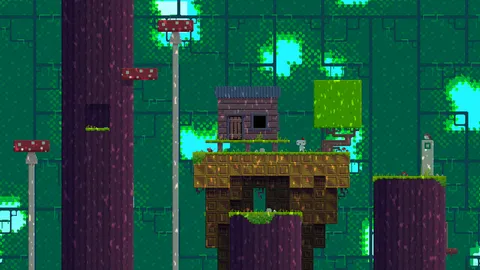

The indie puzzle-platformer Fez turns traditional 2D gaming on its head with a unique 3D rotation mechanic that reveals new paths and puzzles. Its charming pixel art and inventive gameplay make for a delightful and cerebral experience that transcends dimensions.
In the indie game Fez, you take on the role of Gomez, a small, white creature who lives in what appears to be a 2D world. Designed by Phil Fish and developed by Polytron Corporation, the game turns traditional platforming on its head by introducing a third dimension. Initially appearing as a 2D sidescroller, the game world is dramatically expanded through the discovery of a magical fez hat that grants Gomez the ability to rotate the 2D world in a 3D space.
The core gameplay of Fez revolves around solving puzzles, which often require the player to manipulate the environment by rotating it. This changes the arrangement of platforms and reveals previously hidden paths. While the game has platforming elements, it lacks the combat or life systems found in typical platformers, focusing instead on exploration and puzzle-solving.
Fez is lauded for its retro-inspired pixel art and atmospheric music composed by Disasterpeace. The unique visual style blends nostalgia with innovation, offering a rich, immersive experience. The score similarly complements the visual aesthetic, using chiptune elements to evoke a sense of wonder and curiosity.
Released in 2012, Fez received critical acclaim for its innovative gameplay mechanics, art direction, and soundtrack. It won several awards and inspired a strong following, including a range of fan-made content and analyses exploring the game's deeper themes and mechanics.
Despite its somewhat controversial development history, highlighted in the documentary "Indie Game: The Movie", Fez remains an influential title in the indie game community. Its fresh take on puzzle and platforming mechanics has inspired a new wave of developers to think outside the box—quite literally—when it comes to game design.